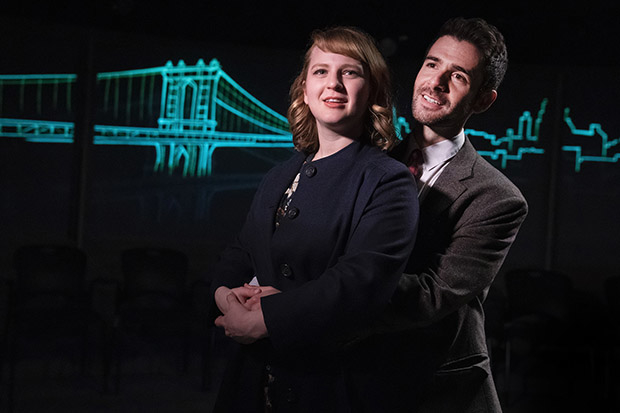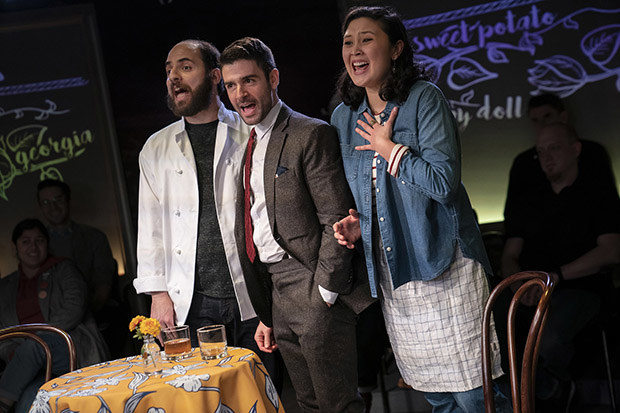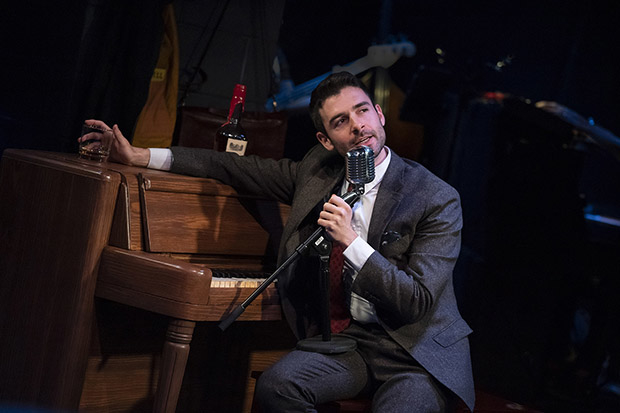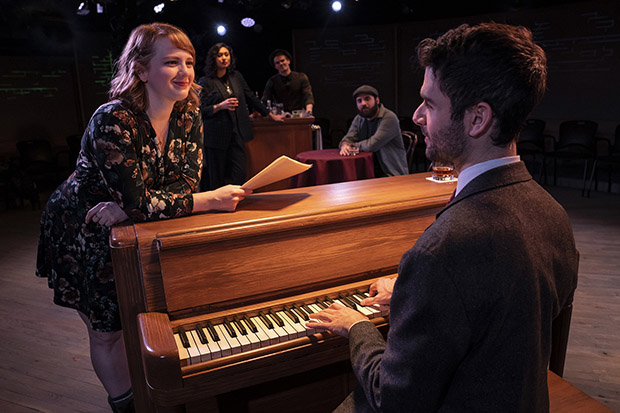Darling Grenadine Is Deadly Saccharine
It’s the cutest little musical about alcoholism you ever will see.

(© Joan Marcus)
Darling Grenadine opens with the audience seated in a circle. The protagonist, Harry, stands to introduce himself. "Hi," he says, pausing for effect. And if you're expecting him to say his name and that he's an alcoholic, chances are you're familiar with this audience formation and the premise of Daniel Zaitchik's new musical at Roundabout Underground. Zaitchik, who penned book, music, and lyrics, takes on the difficult subject of alcoholism in an off-putting manner that trades truth for whimsy. With the help of director Michael Berresse, he curates the story of addiction the way a Lower East Side speakeasy proprietor might select decor and glassware.
In fact, Darling Grenadine takes place in just such an establishment: "Standards" is the piano bar that Harry (Adam Kantor, charming in a somewhat untrustworthy way) runs with his brother, Paul (Jay Armstrong Johnson, valiantly committing to an emotional through line that feels only half considered). Paul works the bar, while Harry tickles the ivories and serenades the room with well-known songs. He's a composer, but avoids playing his own tunes, the most notable of which are commercial jingles. But he starts singing a new song when he falls for a "swell" Broadway actor named Louise (Emily Walton, cute as a button). The only question is, does he love her more than he loves the bottle?

(© Joan Marcus)
The funny and versatile actors Matt Dallal and Aury Krebs fill out the boutique world of this chamber musical by playing every other man and woman, while trumpeter Mike Nappi takes on the role of Harry's dog, who is confusingly also named Paul. An irrepressible grin on his face, he blows into his trumpet to create the dog's voice. "It was so great to meet you, Paul," Louise responds like a Disney princess to the panting trumpet — and that's not even in the top 10 twee moments in this sickeningly adorable script.
Zaitchik has a fondness for mawkish lyrics that are likely to send some audience members into sugar shock. On her second date with Harry, Louise sings a number in which she confesses, "Every time a waitress calls me honey, I die of happiness." This is apparently because when strangers in service positions treat her kindly, she interprets that "someone likes me just for bein' alive," which is an awfully generous read of tipping culture. Later, they sing a duet about red and black licorice, which Harry insists on pronouncing "lico-riss," like a sassy three-year-old.
But don't think this cutesy-poo musical is entirely sexless: Harry makes a booty call to Louise with the song "Bottle of Wine," in which he entices her to his apartment to help him create a "numbah." Then there's the song "Manhattan," which compares the island from which these folks never seem to venture to a jealous woman.

(© Joan Marcus)
As imagined by director Michael Berresse, Manhattan is a world of matinees, fedoras, and craft cocktails. Vulgar iPhones are represented as vintage radio mics. Money seems to be of not much concern to anyone. And when Harry goes on a bender, he does so with a top-shelf bourbon. Darling Grenadine isn't so much set in New York as it is the New York Times style section.
Costume designer Emily Rebholz does her part with Harry's exquisitely tailored suit, which is replaced in the second act by a comfy cardigan — the essential garment for convalescence. Tim Mackabee's set design maintains the frame of the AA meeting while placing compact set pieces on castors, to be quickly rolled in and out of the center. Projection designer Edward T. Morris decorates the surrounding walls with animated skylines, street scenes, and in one instance, a bunch of dancing terms of endearment like "sunshine," "gumdrop," and "jelly bean."
Sound designer Brian Ronan ensures that we can all hear every barf-inducing lyric in this musical in-the-round (no easy task). And Lap Chi Chu impressively creates a variety of natural and artificial lighting effects under the lowest ceiling of any theater in town: I marveled as actors whipped past some low-hung LEDs, seeming to just clear them by inches. It was, by far, the most dramatic aspect of the whole evening.

(© Joan Marcus)
A second act Hail Mary attempts to gin up genuine emotion in the audience, but feels more like transparent manipulation of an off-Broadway audience laden with pet lovers (cue Sarah McLachlan). I found it difficult to connect with any of these cardboard New Yorkers, so it was hard for me to care about their contrived problems.
This is unfortunate, because Zaitchik has a unique musical voice and a talent for writing infectious melodies beautified by complex harmonies. Too often, however, those songs completely stop the action of the play, which isn't much of a play to begin with in the case of Darling Grenadine. Hopefully, a swell book writer will come into his life soon.











